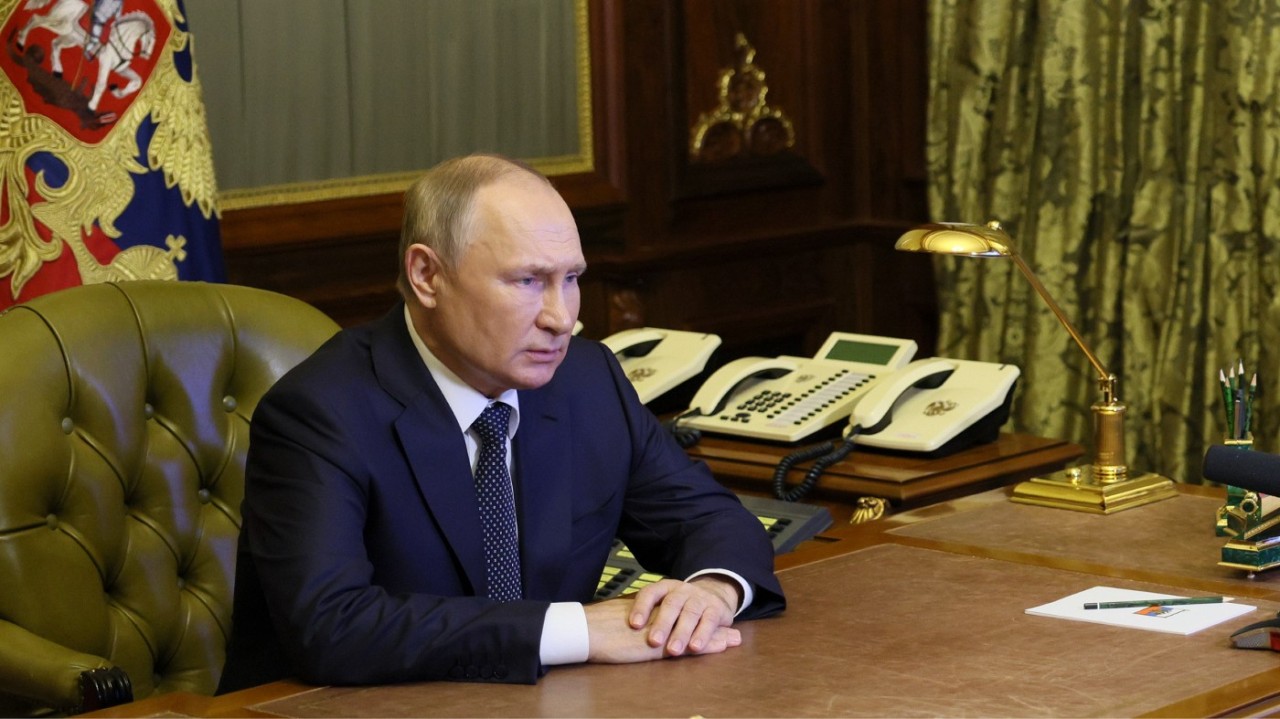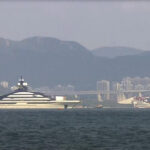
VIENNA – Vladimir Putin on Monday ordered a barrage of rocket attacks against Kyiv and nine other Ukrainian cities, an action the Russian president himself characterized as a “harsh” response to an explosion on a crucial bridge linking Russia to the occupied Crimean peninsula.
The White House condemned the attacks, which killed at least 11 people, saying they had no military purpose and demonstrated “the utter brutality of Mr. Putin’s illegal war on the Ukrainian people.”
“These attacks only further reinforce our commitment to stand with the people of Ukraine for as long as it takes,” President Biden said in the statement.
The escalation comes as the U.S., allies and security experts have raised the alarm about the prospect of nuclear confrontation to its most dangerous point since the Cold War.
Experts characterized the overnight missile attacks as a brutal but somewhat predictable response by Putin to the bridge attack, and one that was less risky than the use of a tactical nuclear weapons that he has threatened.
“The easiest, fastest way for [Putin] to strike back is to use missile strikes on civilians, so that’s what he did today,” said Melinda Haring, deputy director of the Eurasia Center at the Atlantic Council. “That doesn’t mean he doesn’t use nukes, but he loses a lot if he uses nuclear weapons.”
The Russian president retaliated after an explosion on Saturday damaged the Kerch Bridge, a Russian rail and road line to Crimea, which Russia annexed from Ukraine in 2014. Putin had celebrated its opening in 2018, and it is viewed as a key supply route for Russia’s military offensive on the south of Ukraine.
Ukrainian officials have long viewed the bridge as a strategic target that would strike at Putin’s heart and Moscow’s military operations and embarrass the Russia leader.
“This bridge was important to Putin; it was one of his pet projects and it was difficult to engineer, it took a long time to build this thing,” Haring said. “He took it personally and it shows the weakness of Putin, but it also shows that he’s got nothing left. His only response is to target civilians.”
Putin blamed “Ukraine’s special services” as the “initiators, performers and masterminds” of the bridge attack. Ukrainian officials have not publicly taken responsibility for the attack, but The New York Times reported that a senior Ukrainian official corroborated Russian reports that Ukraine was responsible.
Close to 100 people were injured by Russia’s wide-scale attacks against Ukraine on Monday. Critical infrastructure was hit, temporarily disrupting water and electricity services, Ukrainian officials said.
The strikes on Kyiv raised the potential of foreign governments being caught up in the damage — with an unused German visa office coming under fire on Monday.
U.S. Ambassador to Ukraine Bridget Brink wrote on Twitter that the U.S. Embassy Kyiv team is “safe after another wave of Russian strikes on civilian sites. Grateful to those responding and working to keep us safe, and heartbroken for those hurt, here and across Ukraine.”
Moldova’s foreign minister said that at least three Russian cruise missiles launched from its Black Sea Fleet had crossed into its airspace, condemning it as a violation.
“I think the international community will certainly have a reason to be more concerned and see it as a major escalation,” said Marcin Zaborowski, security expert at GLOBSEC, a think-tank based in Bratislava, Slovakia.
Zelensky is expected on Tuesday to address an emergency, virtual session of the leaders of the Group of 7 nations — the U.S., Canada, United Kingdom, France, Germany, Italy, and Japan — in addition to the European Union.
“Russia’s horrendous attacks against Kyiv and other cities across Ukraine show the desperation of the Kremlin. These indiscriminate attacks on civilians are war crimes,” tweeted European Council President Charles Michel.
Zaborowski said Putin’s framing of the bridge explosion as an act of terrorism could pave the way for the Russian leader to move from calling the military offensive in Ukraine a “special operation” to declaring all-out war. He might then say a full mobilization in Russia was necessary, he said.
There has been much worry about whether Putin has an “off-ramp” to deescalate the conflict, a point Biden made at a private Democratic fundraiser last week.
Former Joint Chiefs of Staff Chairman Mike Mullen described Putin as a “cornered animal” in an interview with ABC News on Sunday. Putin has faced backlash in Russia over embarrassing battlefield defeats and an exodus of Russian men from the country fleeing Putin’s partial mobilization.
Mullen said that the pressure on Putin has made him “more dangerous,” and called for stepped up diplomatic work to end the war.
But Ukrainian officials and their supporters are pushing back on calls for negotiations, warning that Russia would use any pause in fighting to seek relief from sanctions while regrouping militarily and preparing for harsher attacks against the civilian population.
“Russians need to know that such actions are not unpunishable,” said Hanna Shelest, director of security programs at the Foreign Policy Council Ukrainian Prism. She called for additional sanctions and more military support for Ukraine.
“For example, these long range missiles that can be used by HIMAR systems, that we’ve been asking for, now is quite a good time to say ‘yes, you can get that,’” she said.
To avoid provoking Putin and to prevent U.S. weapons from being used for attacks on Russian territory, the U.S. has handicapped the HIMARS it has delivered to Ukraine to only strike targets within 50 miles, less than the nearly 200-mile range the multiple rocket launch systems typically reach.
The U.S. is the largest provider of military equipment to Ukraine, with an estimated $17.5 billion since Russia’s invasion. Defense Secretary Lloyd Austin will travel to Brussels on Wednesday and conduct in-person meetings with the Ukraine Defense Contact Group, a 50-nation grouping of ministers of defense and chiefs of defense committed to providing support for Ukraine.
Zaborowski echoed the need for more military aid, in particular longer-range artillery for HIMARS and missile defense.
“Ukrainians just have to be given more resources to protect against missile attacks. Essentially they need missile defense … and we might actually get deliveries of systems that have a larger range than Ukrainians have been given so far,” he said.




